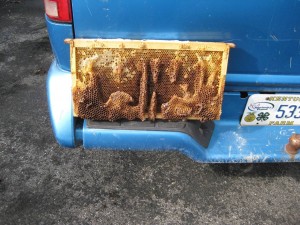I am often asked whether to use nine or ten frames in brood boxes. The answer is up to you, but here are my thoughts.
Conventional beekeeping boxes are designed for ten frames, which allows for the bee space (about 1/4”) between the combs when they are drawn out. Bee space is the largest gap that bees will leave as open space without trying to fill it with unwanted comb. I have often seen hives where the bee space has been violated, and the bees built an extra comb, often attaching two adjacent frames. It is messing with Mother Nature when we push the envelope on bee space, but beekeepers love to be innovative (or sloppy – I’m a sloppy old stick in the mud myself), so we push this limit all the time.
Fortunately, there is some wiggle room in the bee space concept. If we only remove one frame in the brood box and go to nine, keeping the remaining frames evenly spaced, the violation of the bee space is so slight that we can get by with it most of the time. Some beekeepers prefer to use nine frames because it leaves more room between the combs, making it easier to remove and replace frames.
However, it is important to ALWAYS keep these nine frames evenly spaced and ALWAYS, when starting brood boxes with frames containing new foundation, start with ten frames. If you wish to use nine ultimately, remove one when the comb on nine or ten of them has been drawn out. If you start with nine, the bees will often build that layer of extraneous comb right away.

